Books read in 2017
January 7, 2018
You might be aware that I keep a list of my read and “to-reads.” The index keeps growing organically, as I walk into bookstores or converse with friends, but what really drives its growth is that curiosity is exponential: with each book I read, I add a few more to the list. I know I will never be able to finish it.
Last year, I set myself a goal to read 18 books in 2017, and to make sure more of the books I read were written by women. Below is a list of the 18 I got through. Distilling books into a few words is a tough exercise, but if I had to compress my reading into a few ideas, I’d say the overarching themes are emergent behavior, identity formation, otherness, and a fascination with change.
Invisible Cities - Italo Calvino

Walking around the West Loop last December, we came across a great used book store. I picked up Invisible Cities, not really knowing what to expect, but knowing it’d be good. It was. The book is told from the perspective of Marco Polo, who is telling Kublai Khan about his travels through the Khan’s empire. Each chapter is devoted to a city, with short exchanges between the explorer and the emperor scattered throughout. Commentary about identities, culture, and cosmopolitanism make these conversations the best parts of the book. In many ways, the surreal descriptions of the cities reminded me of reading Borges, full of infinities, circularities, and strange anachronisms. With remarks such as “A description of Zaira as it is today should contain all Zaira’s past,” or “The more one was lost in unfamiliar quarters of distant cities, the more one understood the other cities he had crossed to arrive there,” it kept me thinking about path dependence, how experiences form one’s self, and how lucky I am to have traveled around the world. This is one I’ll probably re-read in a few years.
Hillbilly Elegy - J. D. Vance

Like half the people in this country, I spent early 2017 trying to figure out what the hell had just happened. I got this book as a gift, and started reading it right away. The book has become one of the essentials in building up the narrative of the poor white underclass that got Trump to power. When I read it, I saw it as a viable explanation: disenfranchised rednecks losing their jobs were looking to improve their economic outlook. But as time went on, I started buying into that story less and less. I’m convinced the rise of Trump is all about racism and an unwillingness to pay for government services that the other will enjoy - but I digress, back to the book. My life in the US has been limited to a very narrow population, first at Northwestern, and now in San Francisco. With his book, Vance does a good job of giving us a window into a community that, at least for me, had been totally inaccessible. Just that makes the book worthwhile.
We Should All Be Feminists - Chimamanda Ngozi Adichie
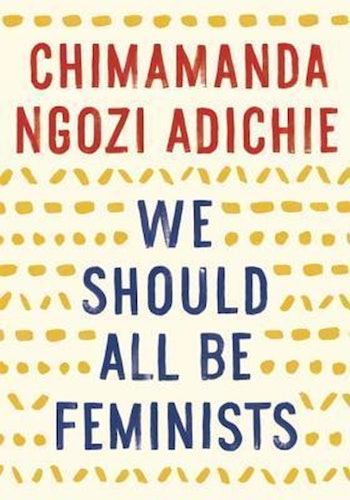
Adding this book here feels like cheating, as it is more a short essay than an actual book. If you don’t want to read the book, there’s a TED talk that has 90% the same content word for word. The main point that Adichie makes is that most issues around gender are structural, and that we should change the way we interact with others if we actually believe that something should be done about gender equality. She makes obvious points (at least, obvious to me), such as the fact that male/female portrayals in our culture are based on old stereotypes, and that we have to educate kids about gender roles differently, but more importantly she talks about how we should react to day-to-day interactions that we tend to ignore.
Season of the Witch - David Talbot

Last year, my book about San Francisco was Gary Kamiya’s Cool Gray City of Love. This time, it was Talbot’s. Unlike Kamiya’s, Season of The Witch talks about a much more specific time in SF history (the 60s, 70s and 80s), but both books tell specific stories of people, places, and events that are often overlooked. It was an enjoyable read, and gave me a fresh view of the city that I live in. The sections that discuss the art and music scene in San Francisco were especially interesting, as I knew all about the images and sounds, but little of their background.
1984 - George Orwell

This one was a re-read. The political climate is harsh, and, like others, I turned to the classic dystopias to try to make sense of it. Needless to say, I saw this book with very different eyes now than ~10 years ago when I read it the first time. It made me think a lot about the Holocaust, and how people slowly get used to things. It is scary to be the proverbial boiling frogs. The news cycle is so fast that we don’t remember what we were angry about a few days ago. As someone joked on Twitter, every day the disembodied head of the president screams slogans and propaganda in doublespeak at us through our pocket glass rectangles. Insanity.
“If there is any hope, it lies in the proles.”
Cat's Cradle - Kurt Vonnegut

This one I read with Hannah. Each day before bed we’d take turns reading a chapter or two to each other, and it made for great conversations. I knew nothing about the book when we started it, and it ended up being full of themes I really enjoy thinking about: technology’s ifnluence on society, social control through culture, and shared identity formation. Most of the book is set on the fictional Caribbean island of San Lorenzo, where people are extremely poor, and the locals follow the cryptic religion of Bokononism. Vonnegut does a great job of building up the tenets of Bokononism, and introduces some great concepts like the Granfalloon, “a group of people who affect a shared identity or purpose, but whose mutual association is meaningless” such as companies, states, religions, and more. It was right up my alley.
Handmaid's Tale - Margaret Atwood
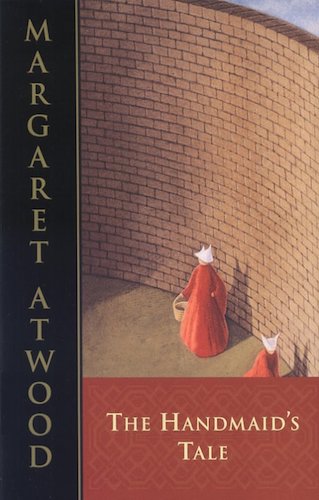
I picked this one up for a similar reason to 1984, dystopic novels help us understand our lives, but perhaps more importantly it helped me understand the lives of others. Handmaid’s Tale is written from the perspective of Offred, an opressed woman in an extremely misogynistic and religious society where there is an underclass of women kept and used only for reproductive purposes. Her story is covered front to back with ideas and details that only a woman could write about. It is easy to build empathy with the handmaids in the book, and the suffering that they go through, but it is also clear that a lot of the themes are just more extreme cases of gender discrimination and violence that occur in our society today. I might start watching the TV show this year.
Onward - Howard Schultz

Ever since I heard Howard Schultz speak at Northwestern four years ago, I wanted to read his books. As a coffee snob who regularly complains about Starbucks’s quality, I went to the event with low expectations and interested mostly in the cult of personality. Even though I hate their product, he did a good job and got me interested in his company. Now, years later, having finally read one of his two books, I have to say I feel conflicted about Onward. The book lays out the reasons for Starbucks’s outsized role in the industry, and its influence in American coffee culture, but it does so with a self-indulgent tone that’s hard to take seriously. I did a full review back in July, and I think reading that will give you all the info you need - reading the book is not worth it.
Flash Boys - Michael Lewis

This is another book I had been meaning to read for a while (although I actually listened to the audiobook). In it Lewis sheds light on one of the many faces of economic arbitrage in the 21st century. Flash Boys is a story about how Wall Street banks, hedge funds, and other financial institutions apply high frequency trading (HFT) techniques to gain an edge over other players in the most competitive financial markets. It is a great story at the intersection of technology, finance, complexity, and human behavior, and I found listening to it quite enjoyable. Read my full review here.
Neuromancer - William Gibson

When I was at Northwestern, one of my professors in the economics department insisted that as someone working in technology I should read Neuromancer. In my professor’s words, “you’d never believe it was published when it was,” and Gibson’s view of the future in 1984 was indeed forward-looking. He came up with the concepts of Cyberspace, as well as The Matrix “a consensual hallucination experienced daily by billions of legitimate operators, in every nation … A graphic representation of data abstracted from banks of every computer in the human system. Unthinkable complexity.” Reading this in the 80s must have evoked very different images than it does today. In some ways Gibson’s writing was amazingly prescient. On the one hand, biohacking and internet-like virtual reality are central themes to the story, but on the other hand so are payphones. What I found most interesting in the book were the conversations between people and machines, and their discussions of consciousness, memory, and mortality. Had I read it when it first came out, those would not have been as interesting.
Man's Search for Meaning - Viktor Frankl

My friend Dana had recommended this one a couple of years ago during a trip to New York. The book is divided into two parts. The first, a narration of Frankl’s experience as a prisoner in Auschwitz during World War II, is much more interesting than the second, an introduction to Logotherapy, the author’s theory of psychology. As you would expect, the book is full of horrible stories from the death camps, but Frankl’s tenet of finding meaning in the worst conditions imaginable gives the reader reasons to be optimistic, too - even there, people found humanity and reasons to keep going. Listening to this audiobook made for some very introspective bike rides to and from work. “Those who have a why to live, can bear with almost any how.”
Zen and the Art of Motorcycle Maintenance - Robert Pirsig
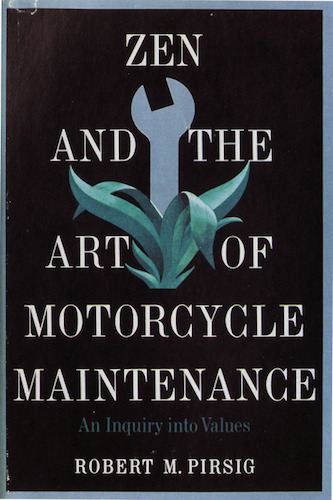
This one was a tough one. I still can’t decide whether I liked it or hated it. Zen is a book of dichotomies. Romantics and classics, technology and humanism, the narrator and Phaedrus. At first, I enjoyed the conversations about philosophy, but hated the author’s ramblings on Quality – his undefinable theory of reality – and his time in academia. The book is redeemed by the fact that it is based on the author’s life and his struggle with schizophrenia. The stories of human interaction with friends, family, colleagues, and the narrator himself are much more interesting than the philosophical discourse.
I clearly remember adding it to my to-read list during my Software Project Management class, when my team had strayed from our objective, and our professor interrupted us to tell us about a scene: the characters are camping, and the lead wants to make dinner, so he searches for a machete, but it is dark, so he goes through his bag first to find a flashlight, but can’t find it, so he goes to his motorcycle and turns on the headlamp to find the flashlight. “It takes a long time to realize I don’t need the flashlight, I need the machete, which is in plain sight.” By the time he found it, the fire had been lit by someone else. That day I learned about yak shaving.
Imagined Communities - Benedict Anderson

This was probably the most enlightening book I read this year. This one was a recommendation from my high school history teacher. Soon after the election, and after a bad experience renewing my visa I started reading obsessively about identity, nationalism, states, and nations, so naturally I asked him for books worth reading, and this was his suggestion. Anderson’s book defines a more rigorous version of Vonnegut’s granfalloons. I tried hard to understand it, so I took notes along the way. Anderson explains the rise of nations as a confluence of trends. The erosion of religion, the rise of print capitalism, the appearance of “shared linear time,” the growth of the bureaucratic state, and the distance between imperial colonies and their capitals, all created the right environment for nation-states to become the undeniable paradigm for governance in our time.
Personally, reading about the creole communities in colonial America, and how they saw themselves vis a vis Spain, England, et al, hit close to home. The son of a Spaniard in America did not see himself as an American, but as a Spaniard, while in the eyes of someone in Madrid, he was not a True Spaniard. Eventually, the Spanish bureaucrats started to think of themselves as “homeless,” sharing much more with the administrators of other nearby colonies than with the motherland. I see a similar kind of identity loss happening in my life, and in many of my contemporaries’.
We take the existence of nation states as a given, and it is hard to imagine a world without them, but technology and politics are aligning in strange ways these days. Expect me to write more about this one at some point soon.
But What If We're Wrong? - Chuck Klosterman

When I told Hannah I was going to read this, she looked at me, incredulous, and told me, “That just doesn’t seem like an author you’d enjoy.” But after reading it, I could not shut up about it. I was introduced to it when Russ Roberts interviewed Klosterman for a lighter than usual episode of EconTalk. The book’s main idea is well synthesized by what the author calls Klosterman’s Razor: “…the philosophical belief that the best hypothesis is the one that reflexively accepts its potential wrongness to begin with.” That’s an idea I can get behind. While I am not contrarian for the sake of being contrarian, I do take pride in the heresy of considering the potential wrongness of ideas that most people take for granted. It is somewhat odd to discuss whether The Beatles, Elvis, or Dylan might not be worth remembering, a few pages away from a scientific conversation about whether we’ve arrived at the end of knowledge, but, in fact, it is the variety of fields from which the author presents unthinkable thoughts that makes it an interesting read. Klosterman’s book is full of dubious claims, and has little to no academic rigor, but I’d still recommend it. If anything, it will make you realize what you’re wrong about, and make you better off in the long run.
The Undoing Project - Michael Lewis

This was another gift, which I had first added to my stack when I heard of it described as “the lighter version of Thinking Fast and Slow.” When I started reading the book, and Lewis spent a full chapter talking about sports I thought of putting it down, but powered through it until the real content began. The Undoing Project tells the story of Amos Tversky and Daniel Kahneman, two psychologists who revolutionized not just the field of psychology, but also that of economics, ultimately getting Kahneman the Nobel Prize in Economics (after Tversky’s death). Beyond explaining their research and discoveries, much of the book is biographical, telling the origin story of how the two got started in the field and built one of the best working relationships you can imagine. An amusing aspect of the book for me is how much the story of these two is tied to the story of Israel as a young country, and how much Lewis explains details that the average reader is not at all familiar with, but which I’ve known since my childhood. I probably should put the time in and read Thinking Fast and Slow as well.
Everything and More - David Foster Wallace
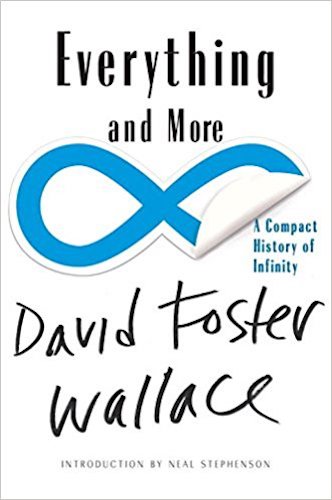
As a mathematics book written in a pop-science style, Everything and More walks a thin line between being too technical for the untrained reader and too dumbed down for the expert. For better or for worse, I fall somewhere in between. I found the explanations of complicated mathematical ideas and their proofs entertaining, but enjoyed most DFW’s recounting of the field’s development during the 1700s and 1800s. What was most striking was how much of a parallel I could draw between the development of calculus and today’s state of the art in computer science: treating useful but poorly understood methods as black boxes can lead to strange places. Read my full review here.
Walkaway - Cory Doctorow
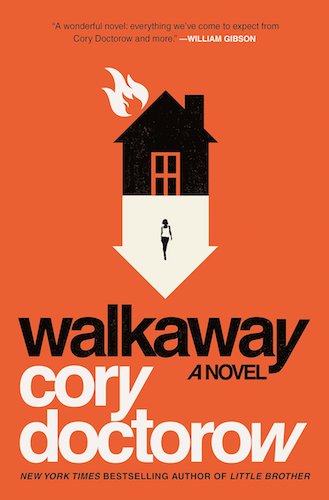
Perhaps it is recency bias, but I think Walkaway was my favorite one of the year. The book touches on all sorts of present day anxieties, taken to the extreme: From people going in debt to acquire useless education/degrees, to the rising costs of healthcare, the growing power of the surveilance state, the concentration of wealth in the hands of a few, and more. The story develops in a near-future Canada, where civilization has devolved into two distinct subsets. On the one hand, there is default, where the zotta-rich oligarchy has fully captured the economy, and the working class has no agency or opportunity, working hard to barely get by. Then, there is walkaway, where those who have had enough of the status quo are building a new system, and are experimenting to see how to organize this new society. It is a textbook example of exit.
Before reading the it, I had read an essay by Doctorow describing it as a Coasean Tale, so I read it with a predisposition to see most events in the plot through the lens of coordination problems. I’m sure most people wouldn’t have caught that, as it is never made explicit, and the discussions of the implications of new technologies like advanced material sourcing/3D printing or inmortality through brain-uploading overwhelm the nuanced talk of organizational behavior. Knowing that the ultimate message was about finding ways to improve how humans build on each other’s work made it all the more interesting.
My one complaint is that the book was written in a point-counterpoint style, where long winded and deeply engaging conversations on dense topics like post-humanism and property rights are suddenly contrasted with scenes full of sex and violence. Doctorow could have toned the latter down and done a better job of blending the two, but the arguments exposed by the characters are so interesting that even with its disjointed style the book was very enjoyable.
Organizing human behavior is one of the hardest and most rewarding problems we can spend our days thinking about. The only reason humanity is where it is now is that we’ve figured out how to build on each other’s selfish individual goals, and Doctorow brilliantly illustrates an alternative to our default.
The Death and Life of Great American Cities - Jane Jacobs
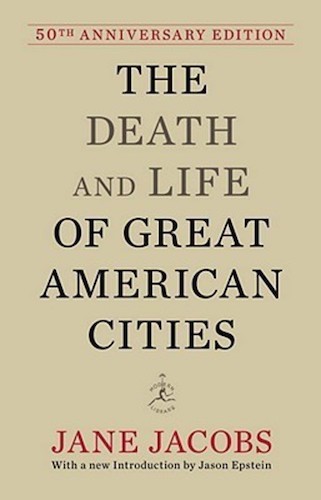
In this classic of urban development studies, Jacobs discusses the decline of cities in the first half of the twentieth century, and proposes a series of ideas for how to turn them around. Like many in my generation, I love dense urban living, and balk at the idea of going home to a non-descript suburb. I live in a lively neighborhood in San Francisco, where public transit, a diverse population, and mixed-use buildings are defining features, and it is hard for me to think of a time when these were not valued and when people thought that the opposite was desirable.
There are many interesting passages in the book (I’ve highlighted some here), but one of the most striking themes was the view that cities are different from towns and suburbs because they oblige us to interact with strangers. In fact, healthy cities promote these interactions, and city dwellers derive a lot of value from them, mostly through emergent behavior. For example, the fact that many individuals from all over the city have independently decided to spend their weekend afternoons in Dolores Park is what makes it a wonderful place to be, regardless of whether an urban designer decided to pour resources into it.
Tying back to a theme I mentioned earlier, Jacobs also makes several arguments that a man would probably not even notice. Several pages are devoted to how (mostly male and white) urban designers assume that men are away at work, while the women were the ones participating in city life. These ideas influenced the way neighborhoods, parks, and schools were set up, and were wholly disconnected with reality, then and now. She discusses, for example, how sidewalks are seen as unimportant by modern designers, even though they are a fundamental tool for urban child-rearing, or how diversity of use of parks in residential areas is minimal, as their design is aimed solely at mothers with their kids. As we’ve come to learn, getting a diversity of ideas and opinions from all sorts of users is central to any kind of design process.
The problems that cities face today have evolved since Jacobs wrote her treatise, and that’s partially because when we look at our cities today the ideas that Jacobs exposed in The Death and Life of Great American Cities have been implemented everywhere. What were once contrarian views are now seen as truths, and urban change has given way to new challenges. Understanding that the problems are structural is a good first step, and Jacobs’ book helped me gain some clarity on things we should be working on.
Additionally, I spent some time reading technical books. Since I didn’t read any of them cover-to-cover, its not worth expanding much more, but they were:
- Mastering Bitcoin - Andreas Antonopoulos
- Effective Python - Brett Slatkin
- The New Flask Mega-Tutorial - Miguel Grinberg
- Clojure for the Brave and True - Daniel Higginbotham
Other books I only read halfway were:
- Seeing Like a State - James C. Scott
- Behave - Robert Sapolsky
Also, Hannah and I tried working through Gabriel García Márquez’s Chronicle of a Death Foretold, which was a struggle for both of us since we were reading it in Spanish.
This year, I’m trying to go for 24. We’ll see how that goes. In the meantime, if you have a book recommendation, or have thoughts on my reviews above, let me know!
Last year’s list is here.
Photo: Powell Books, by me. Previously posted on Portlanding.